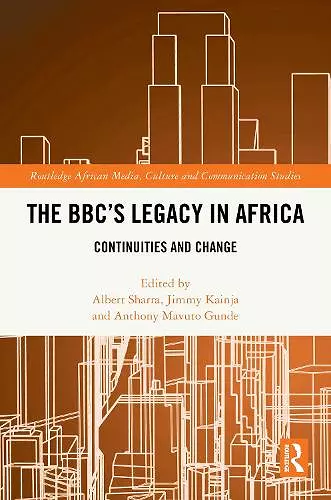The BBC's Legacy in Africa
Continuities and Change
Anthony Mavuto Gunde editor Albert Sharra editor Jimmy Kainja editor
Format:Hardback
Publisher:Taylor & Francis Ltd
Published:19th Aug '25
Currently unavailable, and unfortunately no date known when it will be back

This book critically examines the historical and ongoing influence of the British Broadcasting Corporation (BBC) on African broadcasting, tracing its colonial roots through to its post-colonial legacy.
The book details how in the 1930s the BBC established radio transmitter sites in East and Central Africa, thereby positioning itself as a model for broadcasting in British colonies and beyond. Grounded in a decolonial perspective, the book then explores the evolution of African radio structures, funding models, editorial policies and programming strategies. In the post-colonial era, the BBC continued to train, equip and support African broadcasters while maintaining a strong presence through African-focused programming. Some nations fully embraced the BBC model, while others developed hybrid broadcasting systems integrating British, local and transnational influences. Beyond historical analysis, the book interrogates the BBC’s enduring influence on African media, examining how contemporary local broadcasters negotiate, adapt or resist its legacy. A nuanced exploration of these dynamics provides critical insights into the intersection of colonial-era institutions and contemporary African media landscapes.
This book is an essential resource for scholars and researchers in media and communication studies, African studies and decolonial studies, offering a comprehensive understanding of the BBC’s role in shaping African broadcasting.
"The BBC's Legacy in Africa: Continuities and Change underlines the pivotal importance, impact and enduring influence of BBC radio across Africa. It highlights how, from establishment during the colonial era to the post-independence age, the BBC has continued to profoundly shape radio policies, content, training and editorial standards in Africa, infusing its public service frameworks. The book brings together an unprecedented range of scholarly perspectives, unpacking how the BBC model has been adopted, adapted and even ‘Africanised’. It is a fascinating must-read not just covering the historical foundations but also digital transformations and decolonial frameworks within case studies from Malawi, Uganda, Nigeria, and beyond. Crucially, the book is evidence that BBC-inspired journalism remains at centre of African realities. The account is valuable to scholars, journalists, and policymakers interested in media history, broadcasting regulations, and blue-sky thinkers about public service journalism in Africa."
Professor Winston Mano, Communication and Media Research Institute (CAMRI), University of Westminster
"Despite the end of colonial rule, the BBC continues to shape the nature of radio broadcasting in Africa. This unique volume demonstrates the persistence of colonial media legacies and the way in which African radio has incorporated, sustained and adapted BBC’s broadcasting model. It provides an excellent, nuanced and critical account of BBC’s contested legacy in a range of African countries."
Dr Wendy Willems, Department of Media and Communications, London School of Economics and Political Science (LSE).
"A timely contribution to the literature on media development in Africa focusing on the complex influence on African radio by principally the BBC. While the BBC had a shaping influence on programming and broadcast styles, it had limited to no influence on the transition from state broadcasting to genuine public broadcasting characterised by institutional autonomy and editorial and programming independence. The book also highlights some innovations that go beyond following the BBC model."
Professor Tawana Kupe, Research Scholar, Michigan State University, USA
ISBN: 9781041017394
Dimensions: unknown
Weight: 550g
192 pages